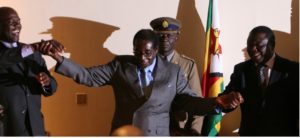JOHANNESBURG — When Zimbabwe’s generals moved against President Robert Mugabe on Wednesday, their action foreshadowed the potential end of more than just one political career. It echoed across a continent where the notion of the “big man” leader is defined equally by the lure of power in perpetuity and the risk that, one day, the edifice will crumble under the weight of its own decay.

Mr. Mugabe, 93, who took power upon independence from Britain in 1980, is the only leader Zimbabwe has known. He has suppressed perceived threats to his dominance, often brutally, and maneuvered with guile to outflank his rivals. Decades after the furling of Britain’s union flag, he waved his liberation credentials with such skill and frequency that he stood as an emblem, however flawed, of Africa’s yearning to be free of outside control.
Viewing himself as Africa’s true statesman, Mr. Mugabe, even in his 90s, flew regularly to diplomatic gatherings on the continent, including mundane ones in which he was sometimes the only head of state present. Though he is despised in the West and by many Zimbabweans, many Africans view him as a living, historic figure, inspiring diplomats and officials to stand and applaud his speeches criticizing Western powers.
In the end, though, his deft touch deserted him as he weighed the question looming over the end of his regime: who would succeed him. By favoring his polarizing and politically inexperienced wife over his powerful vice president, whom he fired last week, Mr. Mugabe overestimated the loyalty of the military and security elite who took him into custody early Wednesday in what appeared to be a coup.
Mr. Mugabe’s family became his blind spot. He miscalculated the fierce anger that their unrestrained behavior caused in his nation, now suffering through another period of deep economic crisis. Though active in politics for only a couple of years, his wife, Grace Mugabe, 52, made it increasingly clear that she wanted to succeed her husband. “If you want to give me the job,” she told her husband at a gathering this month, “give it to me freely.”
Whatever happens now, experts and analysts said, the days of Mr. Mugabe’s unrivaled hold on Zimbabwe seem at an end. That is a message that offered an unpalatable reminder to leaders who have clung to power for decades in Africa — from Equatorial Guinea and Cameroon to Eritrea and Uganda. Even the wiles of a politician of Mr. Mugabe’s stature do not guarantee success to those who seek to extend their tenure indefinitely.
In Harare, Zimbabwe’s capital, Mr. Mugabe’s precise fate remained uncertain on Wednesday, but many Zimbabweans referred to his house arrest as the end of his unchallenged rule and the start of a new chapter in their lives.
“I’m happy now,” said Donald Mutasa, 37, who was born at the start of the Mugabe era. “I feel like we have just gained independence. I am hopeful we are walking into a new Zimbabwe.”
Read more: With Mugabe’s Era Ending in Zimbabwe, a Warning Echoes in Africa
Source: NYtimes


